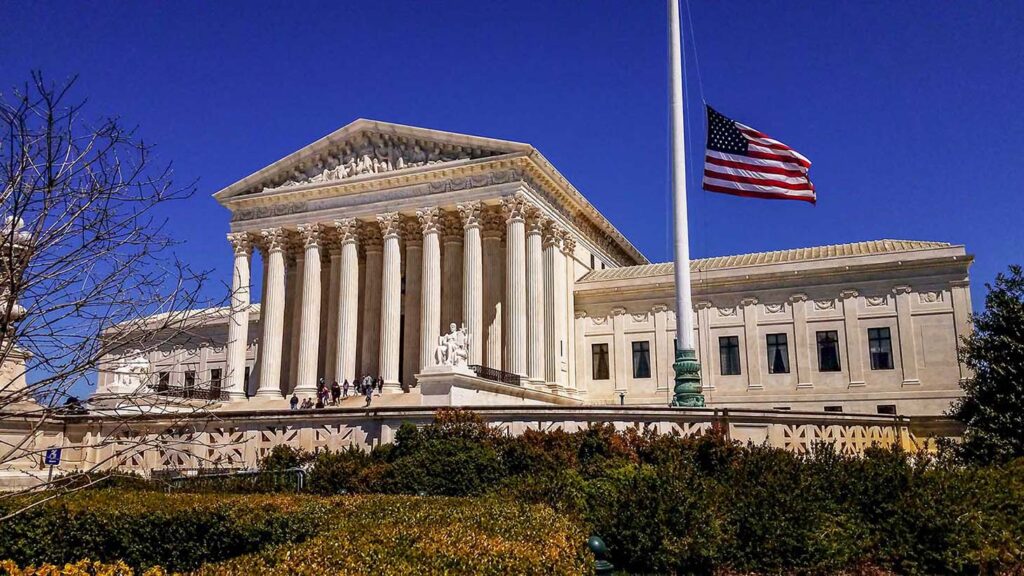In June 2018, the United States Supreme Court handed down a landmark ruling, changing the definition of sales tax to encompass businesses that do not have a physical presence in the state. The case, South Dakota v. Wayfair, Inc. shapes sales tax economic nexus laws in a way that is shaking up the business community as a whole.
Nexus, by example, is a legal term that connects a business presence in a state with the collection of sales tax on a good or service.
“Sales tax economic nexus laws base a sales tax collection obligation on a business’s economic activity in a state,” explains Gail Cole. Gale has written a number of comprehensive articles covering the nexus laws for Stax Bill partner, Avalara, which creates software for automated tax compliance. “This is a departure from precedent, which based nexus on physical presence.”
“The issue is as old as the sales tax itself,” Scott Peterson, Vice President of U.S. Tax Policy and Government Relations for Avalara, confirms. The challenge to the nexus laws “is about the big hole that goes into the sales tax, which is all a function of whether or not you have a physical presence inside of a state.”
The law has been challenged before
This principle has been challenged in the courts before. In 1992, Quill Corp. v. North Dakota, the Supreme Court ruled in favor of Quill Corp over North Dakota’s stand that it should be able to collect tax from mail order products.
However, Gail points out, e-commerce developed after that ruling and “it’s made it much easier for sellers in one state to connect with buyers in another. Unable to tax remote sales, states’ sales tax revenue took a hit.”
That hit was felt most poignantly during the recession in 2008. “States needed every bit of revenue they could get, and for some, taxing remote sales became a priority.” Some states–namely Alaska, Florida, Nevada, South Dakota, Texas, Washington and Wyoming–do not have an income tax, and rely heavily on sales tax.
Consequently, South Dakota established a framework to challenge the physical nexus laws in SB 106. The bill reads in part, “The inability to effectively collect the sales or use tax from remote sellers… is seriously eroding the sales tax base of this state, causing revenue losses and imminent harm to this state through the loss of critical funding for state and local services.”
The bill finally made its way to the Supreme Court in early 2018. Several months later, the Supreme Court ruled 5 to 4 in favor of South Dakota. Without this nexus update, the Supreme Court acknowledged that the state stood to lose “between $48 and $58 million annually.”
A landmark decision changes the way states can collect sales tax
“What the court said in their decision,” Scott says, “was that in their opinion, today, the physical presence requirement established in National Bellas Hess v. Department of Revenue (1967) and its affirmation in 1992 and Quill versus North Dakota was wrong.”
Gail continues: “To the surprise of many in the field, it overruled Quill’s physical presence rule in South Dakota v. Wayfair, Inc.
“Now, many other states are embracing economic nexus. Approximately 25 have already adopted it.”
The changes in the nexus laws do not replace the traditional views, though. “This is not a replacement,” Scott emphasizes. “This is an addition to all the different things that the states have done in the last 50 years to define ‘physical presence’ still applies.”
Expanded criterion to define physical presence
Physical presence in a state has generally been defined by:
- Employees
- A physical warehouse
- Inventory
- Delivering property in a state
“All the court did was add one more criterion, which is that a business could have a number of sales that are in excess of a certain amount,” Scott says.
The thresholds for sales tax nexus is varied
The Supreme Court verdict ruled that within South Dakota, the threshold for collecting sales tax is if businesses “on an annual basis, deliver more than $100,000 of goods or services into the State or engage in 200 or more separate transactions for the delivery of goods or services into the State.”
However, there is not a “one size fits all” sales tax economic nexus law for all the states. “South Dakota’s law basically imposes an obligation on any remote seller and it’s both a value-based law and a volume-based law,” states Rachel A. Le Mieux, CPA, CM, tax expert and partner at Peterson Sullivan LLP.
Gail explains,
“With economic nexus,the obligation to collect tax is triggered by a certain amount of sales and/or transactions in a state. The challenge for businesses is that every state defines those thresholds differently, just as sales and use tax laws are different from state to state.”
“Unlike in Europe, where there is a single tax rate for just about everything, U.S. sales tax rates vary from state to state, county to county, and city by city. It’s a complicated situation that’s impossible to manage manually,” states Bruno Oghittu from Christian Louboutin, an Avalara customer.
Gail outlines five examples of different state thresholds and the transaction types related to the varied interpretations of the sales tax.
- Connecticut’s threshold is at least $250,000 and 200 or more retail sales in the state
- Minnesota’s threshold is 10 or more retail sales totaling more than $100,000, or 100 or more retail sales in the state
- Alabama’s threshold is based on retail sales of tangible personal property in the state
- Georgia’s threshold is based on retail sales of tangible personal property delivered into the state electronically or physically
- A very few states (including Massachusetts), apply economic thresholds to internet sales only.
The compliance timeline also changes from state to state. “States tend to give 30-60 days’ notice when they make the announcement,” Laura says Moses, Manager, Emerging Sales for Avalara. “But every state is different and new states come forward every month.”
Education is key to understanding the changes
“For the short term, the biggest challenge businesses will face is keeping up with changes in state laws and understanding how they impact their business,” she says. “The devil is in the details.”
“All businesses who exceed the economic thresholds are impacted,” explains Laura.
“Many businesses who had previously only collected in 1 or 2 states are now required to collect and remit in up to 20 new states.”
The new tax changes are not simply for e-commerce, Rachel points out. “A lot of people thought, ‘That that was just online sellers… we don’t really need to worry about it’ but that is in fact not true.
After the decision was handed down, she says there were many comments made such as: “‘Oh good. Physical presence doesn’t cause me to have a collection responsibility anymore.’ And that’s simply not true,” Rachel emphasizes. “Physical presence will still cause nexus so despite sales value or sales volume, if you have a physical presence you most likely have a collection responsibility.”
Rachel uses her own company as an example. “A company like mine, which is a CPA firm, that would have more than 200 separate transactions or more than $100,000 in total sales, would have a now sales tax collection responsibility on the value of our services. Regardless of whether we ever set foot in South Dakota.”
Who the nexus changes do not impact
The experts are quick to note that businesses should not hit the panic button. “The sky actually is not falling but it is the largest change that we have seen since literally 1967,” Rachel says.
Gail agrees. “Growing businesses won’t need to worry about triggering physical presence nexus via employees, relationships with affiliates, or other means (even physical presence nexus triggers vary from state to state). They won’t have to curtail physical expansion in another state if they’re already collecting there due to economic nexus.
“In addition, a lot of states are imposing economic nexus prospectively, meaning they won’t hold a business liable for tax on sales made prior to the effective date of their economic nexus laws.”
However, while they do not want people to panic, it is critical to be aware of how these laws may impact a business. “For some of you, it could cause a tremendous increase in the amount of tax that you have to collect,” Rachel says. “So it will cause an administrative burden to get yourself up and running.”
Avalara customers are already reacting, Gail says. “Many current customers are likely to have new filing and reporting requirements due to the Wayfair decision. A customer who once collected in three states may soon have to collect in 20 states. Luckily, they’re well positioned to do so.”
Preparing for tax changes: the first steps
“One of the biggest challenges is understanding the economic thresholds for every state and then knowing what to do once they understand them,” says Laura. “Many customers are overwhelmed and not sure how to address growing tax complexities.”
Gail outlines several things a business can do to learn how these laws will potentially impact them.
- “Contact a CPA, an attorney or whoever your trusted advisor is to help you walk through what is needed.
- “Undertaking a nexus study would be a good step. It’s essential that businesses understand where they have an obligation to collect today and where they’re likely to develop one tomorrow. While this is a moving target (it will change as a business grows or as states develop new policies) it’s important to get a baseline.
- “Automating sales tax is also a good idea. Sales tax compliance truly is messy. Businesses with nexus in multiple jurisdictions have to deal with different filing deadlines, reporting requirements, rates, taxability rules, and more, all of which are subject to change. For businesses that sell into a lot of states, compliance can be a Herculean task.”
Other tax specialists, such as those at Avalara, can provide critical guidance as well. “Avalara can help you determine if you have nexus, an obligation to collect, in one or more new states,” Gail continues. “Once that’s established, Avalara can take the burden of compliance off your shoulders. It’s also an excellent source of information, and can help you stay compliant despite changing sales tax rates, rules, and regulations.
Laura outlines another common two-step approach.
- First, a robust tax solution will “collect and remit in the states and local jurisdictions where are already registered,” she says.
- “Then, they register in the additional states and local jurisdictions while they implement our solution. This is a great approach because it allows the customer to set up the foundation, then add additional states, as needed, with the click of a button.”
Regardless, this is not something a business can afford to ignore. “Customers who are proactively identifying how economic nexus is affecting them are transitioning the best,” Laura states.
“We were reporting in nine states, but our company has grown immensely over the past couple years and we knew that there was nexus being created in additional states. So we needed something that was scalable,” says Mary Lou Carver from ESET North America, another Avalara customer.
“I’m not in the business of researching tax laws. I’m in the business of selling cyber security and software. So for me, and for ESET, it was worth getting that automated and finding the people who are experts in that field.”
The future of sales tax nexus laws
While nobody knows what may happen in the future, Gail predicts that there may be future challenges to the sales tax nexus laws. “Tennessee’s economic nexus law is still being challenged by NetChoice, a trade association of e-commerce businesses and online consumers.
“Furthermore, New Hampshire is vying for a fight. I wouldn’t be surprised to see a legal challenge come from the Live Free or Die State if/when another state attempts to tax sales by a New Hampshire business.
“Or, Congress could intervene. The Supreme Court invited Congress to take up the issue of remote sales tax back in 1992 in the Quill decision. In South Dakota v. Wayfair, Inc., it noted that Congress ‘may legislate to address these problems if it deems it necessary and fit to do so.’ The House Judiciary Committee met to examine the Wayfair decision and its impact on businesses and consumers shortly after the opinion was released. Some in the committee, notably its Chair, Bob Goodlatte, are opposed to allowing states to tax remote sales.”
Stax Bill can seamlessly integrate with the Avalara Tax Software to navigate the complexities of these laws.
TIP: The Avalara Resource Center has compiled a wealth of information on the economic nexus laws.







